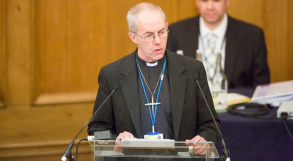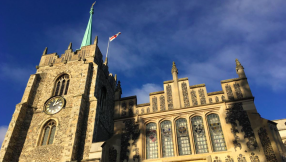"You're constantly alert, never looking into someone's eyes when walking on the street; always aware of what to say and not to say," a Syrian Christian has told World Watch Monitor about life in Raqqa under ISIS rule.
After ISIS took control of the Syrian city of Raqqa in 2014, John – a Chrisitian in his early 20s using a pseudonym – decided to stay in the city with his parents, and survived living there for 18 months, before escaping in the middle of the night.
"Life in Raqqa carries on as usual in many ways. Shops and restaurants are open. There is food, electricity, and water," he said. "People are more fortunate than those living in a city like Aleppo."
However, this day-to-day normality is contrasted with routine executions and violence.
"I saw a lot of cruelty. Every Friday they executed people. I was there when they beheaded the first man in public. They couldn't behead him with the first cut. He suffered so much they finally shot him," he said.
He described how he felt after ISIS beheaded hundreds of soldiers from Raqqa's Syrian army base, before putting their heads on a fence which he walked past every day.
"When I talked with them, I had to know what to say. A wrong could offend them. Seeing all these atrocities, they don't seem like people, they seem like monsters to me, especially after what they did to those soldiers. This traumatised me. It was too much," he said.
"IS hung their crosses from their ears when they put their heads on the fence. What shocked me too was that I saw people taking selfies with the heads. I believe they do this to scare people, to show them what happens when you do something wrong."
In the same week that ISIS declared Raqqa a caliphate, it destroyed three churches, John recalled. "They broke everything inside – the icons, the altar, everything. One church building is now a centre of IS."
Despite this evident persecution, he said it was possible to live in Raqqa and be a Christian.
"We could [convert and] become Muslims and live a normal life in Raqqa, we could leave, or we could stay and pay the jizya tax. The first year the tax was 54,000 Syrian pounds [about US$300] per man – women and children are not 'taxed' – but last year the rate went up to 164,000 Syrian pounds per man," he said.
"Because we paid the tax and had the declaration [confirming the tax was paid] always with us, no-one could harm us for being a Christian."
Despite this, John said he knows only 50 Christian families still living in Raqqa, and the only priest left as soon as ISIS took over.
"I didn't see them mistreat Christians because of their faith. The only thing they did was to take the homes of Christians – and anyone else – who had left Raqqa, because their soldiers didn't have enough houses to live in.
"We never imagined this could happen. Christians in Raqqa were respected. It was a normal Syrian city with no radical Islamic population. In my opinion, what IS is doing isn't real Islam. I have lived with Muslims my whole life; we respected each other and lived peacefully together."
Ultimately, however, John decided to flee the city in the middle of the night to escape the feeling of constant fear.
"Of course it feels better. I might not have water and electricity every day as I did in Raqqa, but I feel safer; inside I have peace," he said.
"In Raqqa there was this constant fear and alertness. Where I am living now, I don't have to be afraid of the people I meet in the streets."















